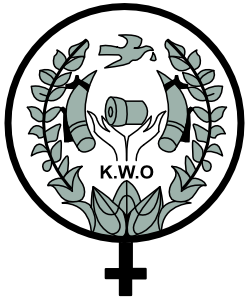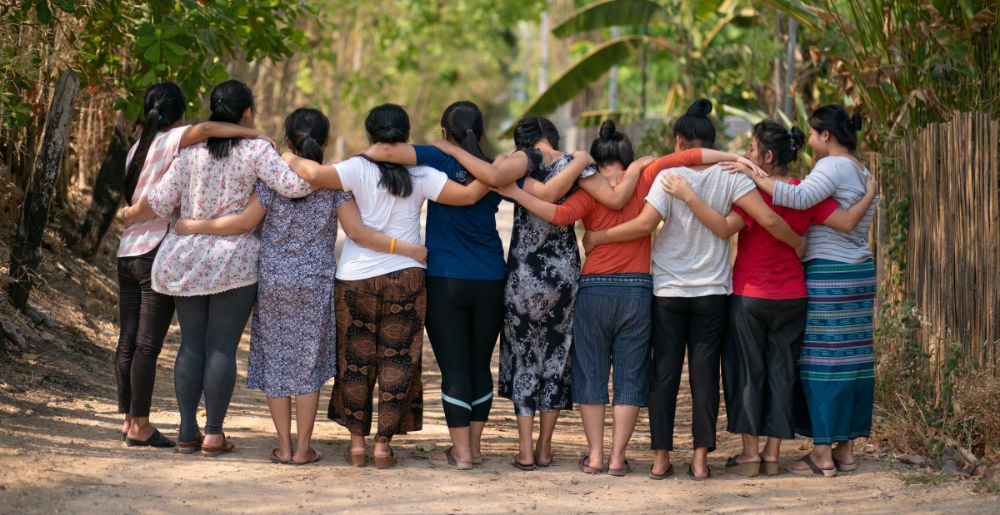KWO provides direct assistance to community members and works towards solving social problems in the community. As refugees and IDPs, the population continues to face difficult social problems that exist in many communities such as sexual and gender based violence, unemployment, extreme poverty, caring for the elderly, the disabled, separated children, families in trouble, support to widows, dealing with increases in youth violence etc. KWO does not work alone but has a large share of the community responsibility to respond to and try to reduce many of these challenges in our society. We work with a range of other CBOs, and some NGOs, to coordinate our efforts to provide a response as effective as possible with very limited resources.
Within the community, KWO essentially fulfills the many and varied roles that, in other circumstances, would be provided for the people by the State Social Services. Whether at Camp, in Karen State, or at Central level, the KWO representative is essentially the go-to person that individuals and social organizations ask for advice or guidance on social welfare issues. They are intimately involved in the community and the welfare of the people who make it up, and are recipients of a high level of trust and respect. Because of this, people feel able to bring problems to their attention, knowing that their concerns will be listened to, considered and hopefully alleviated.
This trust and respect has been, and continues to be, built through continual informal monitoring of social situations in the community. KWO attends, participates in and/or organizes all the social welfare related events in their communities, and organizes and implements the fundraising for these if necessary. They visit and provide encouragement not only to the donor-funded projects in their area but also all the mainstream and unfunded projects, and many individuals. Because of this, they are able to identify specific community needs or problems that need attention, and through their network of contacts with the wider community, are able to advocate for change, and facilitate introductions with potential donors. Also, they are sometimes able to identify a need that KWO can itself turn into a funded project. Unofficially, they continue to direct small amounts of aid, financial or otherwise (clothing, food, household supplies), towards those most in need of social support e.g. widows, new Camp arrivals, emergency Elder Support etc.
KWO members continue to offer their voluntary assistance in many ways which, though important, often go unremarked. (Sadly, this has traditionally been a feature of much ‘women’s work’ all over the world.) In essence, the work that KWO does underpins and facilitates the smooth running of the community as a whole. If there is a community event or meeting- whether a wedding, election or other ceremony- KWO will set the meeting space up, cook and serve food for the participants, and provide that food if necessary. If there are community or Camp visitors, then KWO will see to it that they are hosted and accommodated. If there are vulnerable people in the community needing help, then KWO will organize and/ or provide that help. This help comes in many diverse forms. They visit orphans or children with disabilities at their dormitories or homes and not only provide support and encouragement, but also help to provide the children with food by working in the kitchen gardens. They visit hospital patients with no care-takers and provide the practical care- the food, clothing and emotional support- that they require, and talk to health-care professionals on their behalf. When a death in the community occurs, they provide 24 hour practical and emotional care for the bereaved for as long as that is necessary, and help with the ceremonial arrangements for the funeral. This includes providing the customary food if the family is financially unable to do this. If a woman is accused of a crime and remanded in detention, then KWO workers will ensure that she has adequate food and clothing, and will take turns to ensure her safety in the detention centre by sleeping there also (this is necessary as there are no female security guards). If her case reaches a judicial level, then KWO will advocate on the accused’s behalf to make sure that she is properly and fairly represented.
At all times they continue to advocate for, and raise awareness of the condition of women and children and of SGBV, both in formal and informal situations. They create and oversee ceremonies to honour elders, and ceremonies in which women who have worked tirelessly for their communities can have their work recognized. They provide support and information to ‘at-risk’ individuals, advise them on their options for further action, and facilitate this if necessary. Some examples of this are women reporting adultery and sexual harassment, and those seeking a divorce. They encourage women to build their capacity and wherever possible facilitate this. For example, KWO workers have taught adult literacy classes, and through networking enabled women to learn other skills such as traditional crafts. Through their own example as skilled and confident community leaders, they provide a model to inspire the women that they meet to empower themselves, challenge outdated stereotypes of women’s roles, and increase the voice that women have in their communities.


